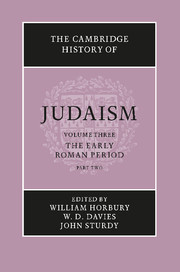Book contents
- Frontmatter
- 1 The archaeology of Palestine 63 bce–ce 70
- 2 The Herodian Temple
- 3 Recent archaeology in Palestine: achievements and future goals
- 4 The contribution of Jewish inscriptions to the study of Judaism
- 5 The social, economic and political history of Palestine 63 bce–ce 70
- 6 The Diaspora in the Roman period before ce 70
- 7 The Gentiles in Judaism 125 bce–ce 66
- 8 Gentiles as seen by Jews after ce 70
- 9 The synagogue
- 10 The Temple and the synagogue
- 11 The early liturgy of the synagogue
- 12 Women in the synagogue
- 13 The Pharisees
- 14 The Sadducees – their history and doctrines
- 15 The Essenes
- 16 The baptist sects
- 17 The troublemakers
- 18 The Samaritans and their sects
- 19 Galilean Judaism and Judaean Judaism
- 20 Jesus: from the Jewish point of view
- 21 Paul: from the Jewish point of view
- 22 Jewish Christianity
- 23 Apocalyptic: the disclosure of heavenly knowledge
- 24 The Qumran sectarian writings
- 25 The Dead Sea Scrolls and pre-Tannaitic Judaism
- 26 Prayer in the Qumran Texts
- 27 Philo of Alexandria
- 28 Josephus (ce 37–c. 100)
- 29 The rabbi in second-century Jewish society
- 30 The Hellenistic–Roman Diaspora ce 70–ce 235: the archaeological evidence
- 31 The legacy of Egypt in Judaism
- 32 Jewish elements in gnosticism and magic c.ce 70–c.ce 270
- Bibliographies
- Index
- References
20 - Jesus: from the Jewish point of view
Published online by Cambridge University Press: 28 March 2008
- Frontmatter
- 1 The archaeology of Palestine 63 bce–ce 70
- 2 The Herodian Temple
- 3 Recent archaeology in Palestine: achievements and future goals
- 4 The contribution of Jewish inscriptions to the study of Judaism
- 5 The social, economic and political history of Palestine 63 bce–ce 70
- 6 The Diaspora in the Roman period before ce 70
- 7 The Gentiles in Judaism 125 bce–ce 66
- 8 Gentiles as seen by Jews after ce 70
- 9 The synagogue
- 10 The Temple and the synagogue
- 11 The early liturgy of the synagogue
- 12 Women in the synagogue
- 13 The Pharisees
- 14 The Sadducees – their history and doctrines
- 15 The Essenes
- 16 The baptist sects
- 17 The troublemakers
- 18 The Samaritans and their sects
- 19 Galilean Judaism and Judaean Judaism
- 20 Jesus: from the Jewish point of view
- 21 Paul: from the Jewish point of view
- 22 Jewish Christianity
- 23 Apocalyptic: the disclosure of heavenly knowledge
- 24 The Qumran sectarian writings
- 25 The Dead Sea Scrolls and pre-Tannaitic Judaism
- 26 Prayer in the Qumran Texts
- 27 Philo of Alexandria
- 28 Josephus (ce 37–c. 100)
- 29 The rabbi in second-century Jewish society
- 30 The Hellenistic–Roman Diaspora ce 70–ce 235: the archaeological evidence
- 31 The legacy of Egypt in Judaism
- 32 Jewish elements in gnosticism and magic c.ce 70–c.ce 270
- Bibliographies
- Index
- References
Summary
Of the religious groups in first-century Judaism dealt with so far it is the Pharisaic which has had the most lasting influence. It developed into Rabbinic Judaism and has persisted to the present. But one other contemporary Jewish group can be compared with it in continued influence. It is the one that arose in response to Jesus of Nazareth, his life, death and resurrection, and ultimately evolved into the Christian Church. The origins of Christianity are immensely complex. They have usually been approached in two main ways which, paradoxically enough, have not been mutually exclusive. One approach, not strictly historical, bearing the authority of a very long history and renewed with vigour in the first half of the twentieth century, has emphasized the radical newness of the Christian Gospel as a supernatural phenomenon breaking into the world with a startling discontinuity which defies rational analysis. The other approach, more characteristic of the nineteenth and twentieth centuries, has sought to understand the emergence of Christianity as a phenomenon to be interpreted within and over against the contemporary first-century religions. The second approach has generally forked in two directions, one leading to the Graeco-Roman world and one to the Jewish. The Christian movement has correspondingly been illumined mainly in terms either of Hellenistic syncretism or of the Judaism of the first century. Only in the twentieth century has the recognition grown that the Hellenistic and Judaic cultures and religions of the first century cannot be easily separated but reveal deep interpenetration (see herein pp. 680–1).
- Type
- Chapter
- Information
- The Cambridge History of Judaism , pp. 618 - 677Publisher: Cambridge University PressPrint publication year: 1999
References
- 1
- Cited by

